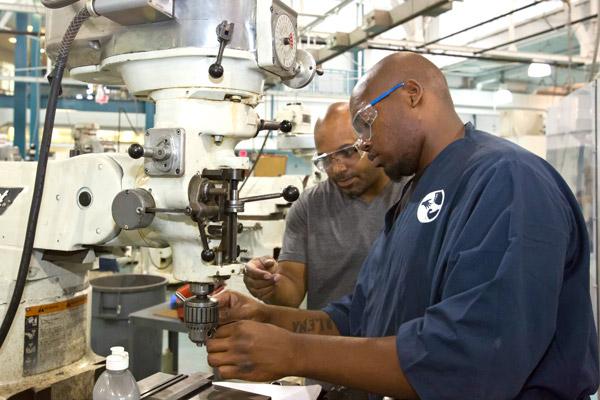

Bad news is hard to hear, like the very bad news that one’s long-held job is about to be lost to the forces of downsizing or outsourcing. This news can strike a blow to a person’s sense of well-being and confidence, generating previously unknown fears and anxieties, and an unwarranted sense of failure.
In the wake of a job loss, the care and support of family members and true friends undoubtedly proves comforting. Most of us in times like this do not want to be left entirely alone. We need others to lift our spirits and remind us that we are not now and never were defined as persons by any job we held.
Each of us is someone’s much-loved child, or spouse, or parent or committed friend. It is comforting in times of loss to be reminded of this.
But comfort of another kind also is needed by many suffering a job loss. They may require the kind of competent support that can help them identify what they are doing correctly right now and what they could do differently in attempting to re-enter the job market.
This is what I find interesting about the Catholic parish ministries created at the time of the recent Great Recession to provide job-counseling services.
One parish I know fairly well refers to this as a career-networking ministry. It invites volunteers who are local executives or business owners, for example, to serve as mentors for people hoping to locate new employment or better jobs.
People seeking good jobs might require help with writing a resume. They might benefit, too, from the insights of someone able to point out new and different ways of putting their God-given talents to use — someone, perhaps, who encourages them to look for work in places they never looked before.
It seems fair to say that the church-based ministries designed to serve as a resource for job seekers actually perform a spiritual work of mercy by giving comfort to the afflicted. In this case, however, comfort adds up to much more than a soothing pat on the back or heartfelt encouragement to stay strong in the face of an unwanted, unsought challenge.
The comfort these ministries offer is concrete and practical. This kind of comfort stands a chance of shoring up a job-seeker’s courage, as well. One of the goals is to clear the way to a rebirth of hope.
“Comfort” is a perplexing term in the vocabulary of Christianity. At one moment Christians are warned away from too much comfort of a harmful sort, while the next moment they are asked to extend comfort to others — others who may live in circumstances that differ hugely from their own.
Many Christians grieving the loss of a loved one pray for divine comfort. In the end they discover that this will spur them, in turn, to stand at the side of others who also are grieving.
Catholics are hearing repeatedly during the Church’s current Year of Mercy that to bring mercy to those who need it most, they must move beyond their comfort zones. Remember, they are advised, that Jesus comforted the afflicted, while afflicting the comfortable.
“Jesus told us that we will be judged by the love we show to those who most challenge our comfort and way of life: the homeless, the immigrant, the sick, the prisoner,” Los Angeles Archbishop Jose H. Gomez noted in a January 2016 speech.
This suggests that the actual demands of comforting the afflicted will open our eyes to realities that are painful to see.
When Christian leaders and educators speak of “comfort,” they often pair it with another term that seems designed to explain comfort’s fuller meaning. Thus, some speak of bringing comfort and “peace” to others or of endeavoring to comfort and “strengthen” them.
People whose lives are unsettled by painful circumstances undoubtedly would benefit from a sense of peace and the kind of strength needed to confront their difficulties.
Thus, comforting the afflicted can mean doing whatever possible to revive the strengths currently hidden away inside them and helping to inject peacefulness — but not passivity — into their lives.
Pope Francis pairs “comfort” with “compassion” and “mercy.” His hope in proclaiming the Year of Mercy was that the Church never would “tire of extending mercy” and would “be ever patient in offering compassion and comfort.”
Compassionate people try to envision themselves in others’ shoes and to view the world through their eyes. Lacking compassion, it becomes next to impossible truly to comfort another person.
It stands to reason, however, that the form of comfort one person welcomes may differ considerably from the comfort that benefits someone else. So extending comfort to others requires listening attentively.
To comfort the afflicted, then, it is essential to become their companions. As Pope Francis put it during a visit last November to the industrial town of Prato, Italy, the Lord invites his people “to accompany those who have lost their way.”
Please read our Comments Policy before posting.
Article comments powered by Disqus Year in Review 2016: a merciful universal Church
Year in Review 2016: a merciful universal Church
 Jubilee year ends, but mission of mercy never does
Jubilee year ends, but mission of mercy never does
 Light of Christ is more powerful than darkness
Light of Christ is more powerful than darkness
 Jubilee of Mercy December 8, 2015 – November 20, 2016
Jubilee of Mercy December 8, 2015 – November 20, 2016
 One person especially needs mercy right now
One person especially needs mercy right now
 Winning directory photo honors Our Lady of Guadalupe
Winning directory photo honors Our Lady of Guadalupe
 St. Paul says: How does the Bible define love?
St. Paul says: How does the Bible define love?
 6 steps to getting married in Diocese of Little Rock
6 steps to getting married in Diocese of Little Rock
 Most frequently asked questions on Catholic marriage
Most frequently asked questions on Catholic marriage
 St. Joseph a model of solidarity with immigrants
St. Joseph a model of solidarity with immigrants
 Two gifts after Jesus’ death: Virgin Mary and Eucharist
Two gifts after Jesus’ death: Virgin Mary and Eucharist
 Why we have an altar, and not just a communion table
Why we have an altar, and not just a communion table
 Pope: Wars should be resolved through nonviolence
Pope: Wars should be resolved through nonviolence
 Living relationship with Jesus Christ in the Eucharist
Living relationship with Jesus Christ in the Eucharist